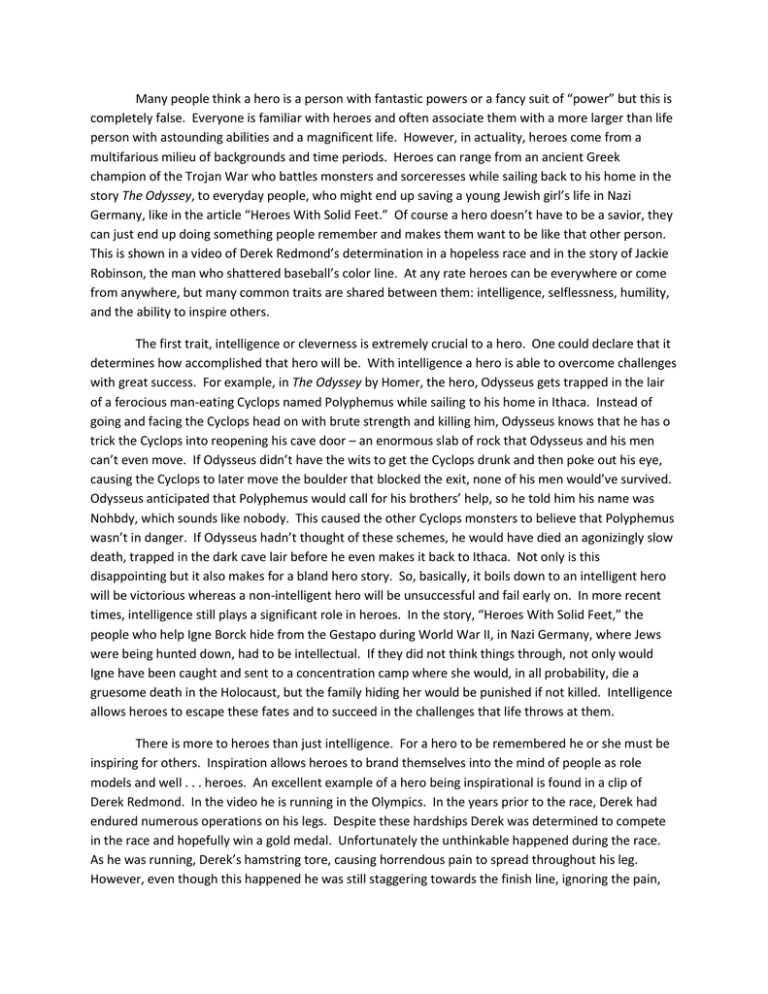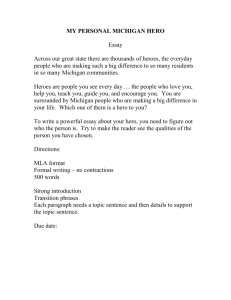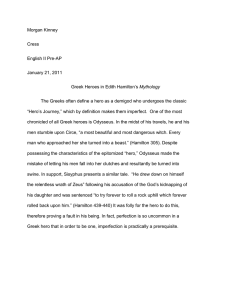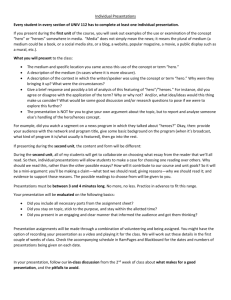Many people think a hero is a person with fantastic... completely false. Everyone is familiar with heroes and often...
advertisement

Many people think a hero is a person with fantastic powers or a fancy suit of “power” but this is completely false. Everyone is familiar with heroes and often associate them with a more larger than life person with astounding abilities and a magnificent life. However, in actuality, heroes come from a multifarious milieu of backgrounds and time periods. Heroes can range from an ancient Greek champion of the Trojan War who battles monsters and sorceresses while sailing back to his home in the story The Odyssey, to everyday people, who might end up saving a young Jewish girl’s life in Nazi Germany, like in the article “Heroes With Solid Feet.” Of course a hero doesn’t have to be a savior, they can just end up doing something people remember and makes them want to be like that other person. This is shown in a video of Derek Redmond’s determination in a hopeless race and in the story of Jackie Robinson, the man who shattered baseball’s color line. At any rate heroes can be everywhere or come from anywhere, but many common traits are shared between them: intelligence, selflessness, humility, and the ability to inspire others. The first trait, intelligence or cleverness is extremely crucial to a hero. One could declare that it determines how accomplished that hero will be. With intelligence a hero is able to overcome challenges with great success. For example, in The Odyssey by Homer, the hero, Odysseus gets trapped in the lair of a ferocious man-eating Cyclops named Polyphemus while sailing to his home in Ithaca. Instead of going and facing the Cyclops head on with brute strength and killing him, Odysseus knows that he has o trick the Cyclops into reopening his cave door – an enormous slab of rock that Odysseus and his men can’t even move. If Odysseus didn’t have the wits to get the Cyclops drunk and then poke out his eye, causing the Cyclops to later move the boulder that blocked the exit, none of his men would’ve survived. Odysseus anticipated that Polyphemus would call for his brothers’ help, so he told him his name was Nohbdy, which sounds like nobody. This caused the other Cyclops monsters to believe that Polyphemus wasn’t in danger. If Odysseus hadn’t thought of these schemes, he would have died an agonizingly slow death, trapped in the dark cave lair before he even makes it back to Ithaca. Not only is this disappointing but it also makes for a bland hero story. So, basically, it boils down to an intelligent hero will be victorious whereas a non-intelligent hero will be unsuccessful and fail early on. In more recent times, intelligence still plays a significant role in heroes. In the story, “Heroes With Solid Feet,” the people who help Igne Borck hide from the Gestapo during World War II, in Nazi Germany, where Jews were being hunted down, had to be intellectual. If they did not think things through, not only would Igne have been caught and sent to a concentration camp where she would, in all probability, die a gruesome death in the Holocaust, but the family hiding her would be punished if not killed. Intelligence allows heroes to escape these fates and to succeed in the challenges that life throws at them. There is more to heroes than just intelligence. For a hero to be remembered he or she must be inspiring for others. Inspiration allows heroes to brand themselves into the mind of people as role models and well . . . heroes. An excellent example of a hero being inspirational is found in a clip of Derek Redmond. In the video he is running in the Olympics. In the years prior to the race, Derek had endured numerous operations on his legs. Despite these hardships Derek was determined to compete in the race and hopefully win a gold medal. Unfortunately the unthinkable happened during the race. As he was running, Derek’s hamstring tore, causing horrendous pain to spread throughout his leg. However, even though this happened he was still staggering towards the finish line, ignoring the pain, the will to give up, and the fact that his dreams of winning were destroyed. Derek might not have won a gold medal or even the race, but his determination would inspire people to not give up for years to come. There was another person who inspired people even before Derek. His name was Jackie Robinson. Jackie was the first African-American major league baseball player. He broke baseball’s color line. This did not come easily. He faced many horrid challenges while he was playing in the major leagues. Due to the fact that he was African-American, Jackie was mistreated by his teammates and his “fans.” Jackie was able to overcome these challenges by staying calm and being able to control himself. By his becoming successful in a so-called white-people-only sport Jackie had paved the way for people to follow their dreams be it baseball or other ambitions even if others do not want them to do it. In addition to being inspirational, a hero should not think of themselves as superior beings when compared to other people. A hero should have humility. Humility allows heroes to realize that they might have some not so heroic qualities or that they make mistakes but that’s what makes them human or similar to humans. Humility is demonstrated in the Norse myth “The Fenris Wolf.” In Norse mythology, the gods need to be able to contain the Fenris Wolf, an evil giant wolf that will someday destroy the world and the gods. The dilemma is that the gods can’t fix a chain strong enough to restrain the wolf. Eventually, the gods forged a chain that does the job. Only there is a catch – in order to allow the gods to put the chain on, one of them must put their hand in his mouth. The god to step up is named Tyr. Tyr is brave but also humble in the sense that he does not see the act as he is the bravest among the gods or deserves huge honor. He does it simply because he has to. Finally, a hero needs to be selfless. When a hero is not selfless, it makes them not so much of a hero. A real hero is someone willing to risk the ultimate sacrifice with no personal regard or gain for himself. An example of selflessness at its height is in “The Fenris Wolf.” Tyr is willing to forfeit his hand to a bloodthirsty wolf in order to allow the other gods to bind him. By containing the wolf the gods buy the earth some time. Tyr’s brave deed is selfless because he lost his hand not for himself, but for the gods. In real life, selflessness is performed by the people who help Inge Borck in “Heroes With Solid Feet.” The people who helped her risked their lives for a girl they barely knew because it was the right thing to do. Overall, a selfless hero is a true hero because he puts others before himself. In conclusion, a hero doesn’t need a fancy costume and super powers. Heroes can be anyone who simply tries. They could have a don’t-give-up-just-keep-going attitude like Derek Redmond, or simply have the willingness to sacrifice something important like Tyr. Maybe a hero just wants to do something nice for another person because it’s the right thing to do – not for a reward. Heroes are more than Hollywood’s Batman, Superman, and Iron Man. They are people who are remembered for their deeds. Be it saving a life to attempting something never tried before, it is the traits of intelligence, selflessness, humility and inspiration that make the true hero.



